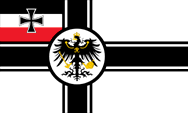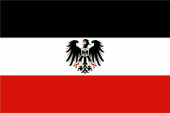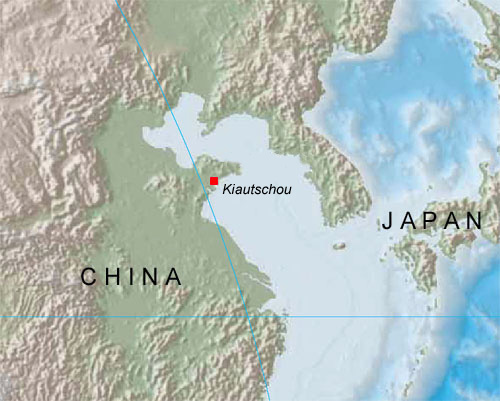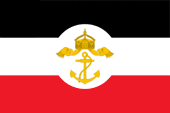



1898–1914,
Naval and war flag






1898–1914,
Flag of the Governor of the Kiaochow colony,
ratio = 2:3





Source, by:
Flags of the World,
Wikipedia (D)

Kiaochow was not a colony in the usual sense, which is – like most other – developed out from commercial interests and colonial societies. The area was occupied in 1897 by naval infantry because of two murdered German Catholic missionaries in the area. It served as a haven for the German East Asia Squadron and was subordinated ander a governor, who was assumed to the Admiralty. That's why here did not fly the flag of the Colonial Office for offizial purpose, but the official flag of the navy of the German Empire. The governor had his own flag, a specialty, that otherwise occurred only in German East Africa.
Source, by: Deutsches Koloniallexikon,
Deutsche Kolonien,
Volker Preuß

Position of Kiaochow:

Source: Freeware, University of Texas Libraries, modyfied by: Volker Preuß

Click or tap to enlarge. Source: Herrmann Julius Meyer,
Public domain, via Wikimedia Commons

Area: 213 sq.mi.
Inhabitants: 192.000 (1913)
Capital: Tsingtau (Quingdao)
official Language: German, Mandarin Chinese
Currencies:
1 Mexican Dollar = 100 Cent
1 Haikuan Tael
1 Tiau = 10 Kesh = 1000 little Kesh
1 Mark = 100 Pfennig
Source: Deutsches Koloniallexikon,
Deutsche Kolonien

1897 · on Shantung peninsula two German Catholic missionaries become killed
14th of November 1897 · The German Empire occupies the Bay of Qingdao and establishes a protectorate
6th of March 1898 · Kiaochow Treaty with China, China cedes Qingdao Bay to the German Empire by leasehold, establishment of a 50 km deep neutral zone around the colony, status of the province of Shantung as a sphere of influence
16th of August 1914 · Japan claims after the start of the First World War, the surrender of the colony, and shortly thereafter begins with the siege
7th of November 1914 · the 4000 defenders of the colony, including 2400 regular soldiers, surrender after nine days of bombardment, Kiaochow becomes occupied by Japan
6th of February 1922 · after pressure of the Allies Japan must return Kiaochow to China
Source: Deutsches Koloniallexikon,
Deutsche Kolonien

The name "Kiaochow" refers to the Kiaochow Bay, which belonged entirely to the territory of the colony. The name of the bay goes back to the 17 miles from the bay placed City of Jiaozhou. "Jiaozhou" means "Glue City".
Source: Deutsches Koloniallexikon







![]()














![]()